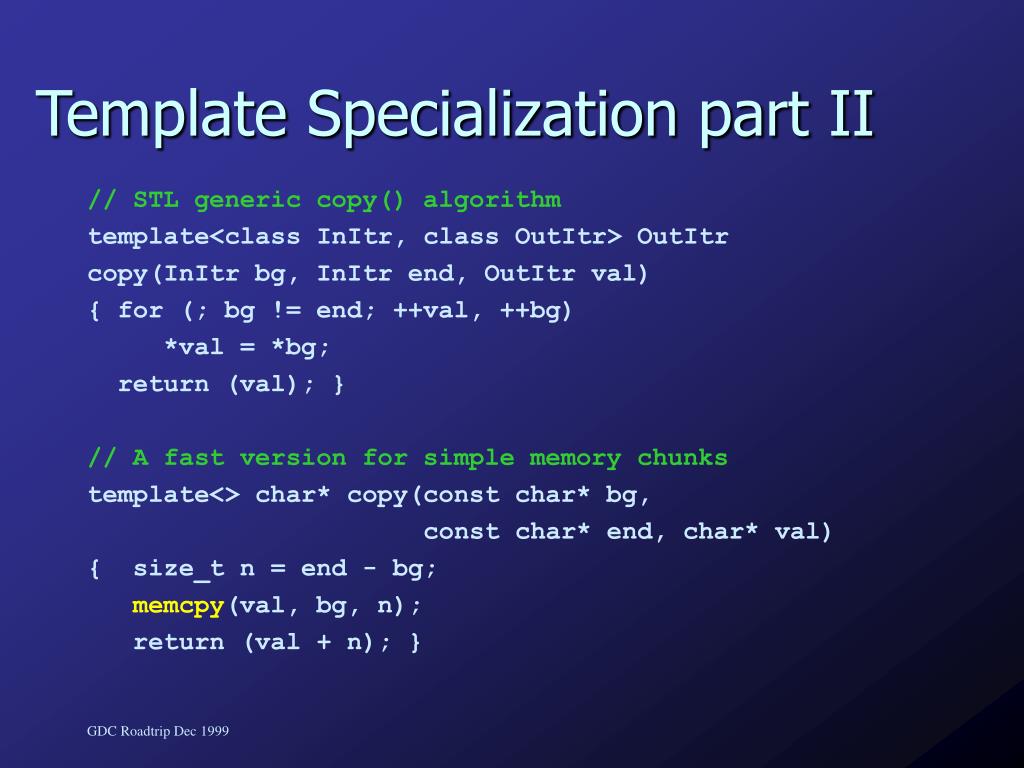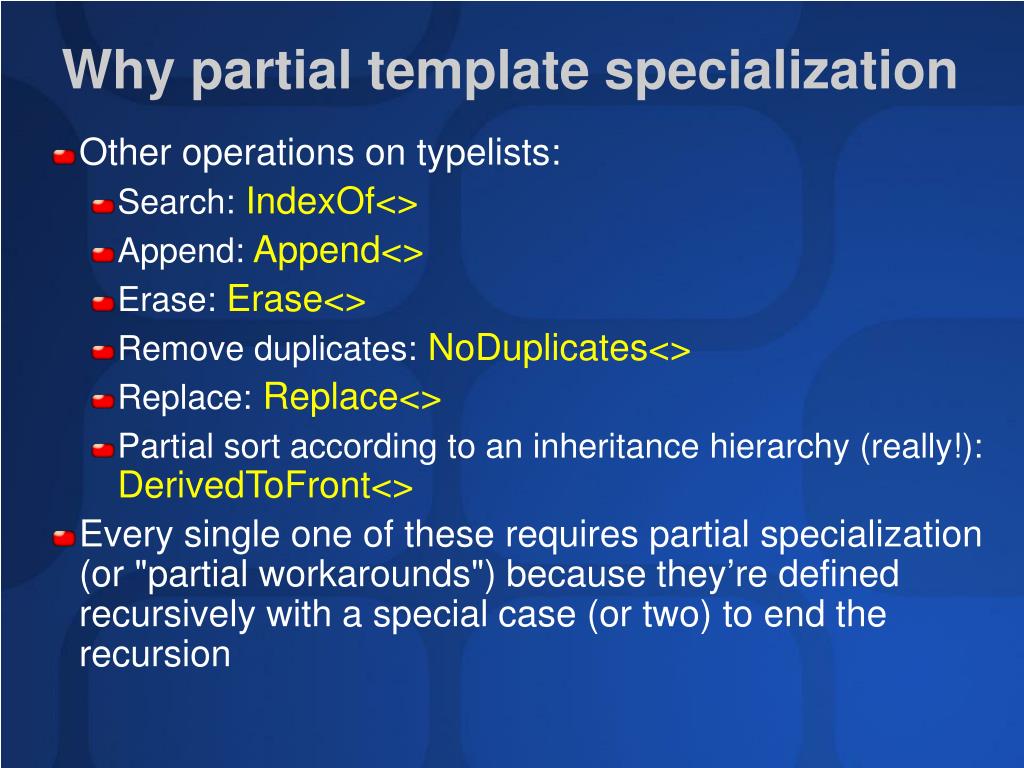C++ Partial Template Specialization
C++ Partial Template Specialization - For partial specializations, those restrictions aren't in place. Web partial template specialization allows us to specialize classes (but not individual functions!) where some, but not all, of the template parameters have been. Web this is called template specialization. Web whether an explicit specialization of a function or variable (since c++14) template is inline /constexpr (since c++11) /constinit/consteval (since c++20) is. Web the following basic example of partial template class specialization, taken from this wiki page: Usually used in reference to the c++ programming language, it allows the programmer to. Web partial specialization allows template code to be partially customized for specific types in situations, such as: Web using partial specialization in c++11. Let's imagine we have a simple template class that holds another object. Allows customizing class and variable (since c++14) templates for a given category of template arguments. Template struct test<int, j> {int j = j;}; Allows customizing class and variable (since c++14) templates for a given category of template arguments. Class template specialization in this case, we’re going to use class. Web well the example in 14.6.5.3/2 in the c++0x draft is a partial specialization. Web whether an explicit specialization of a function or variable (since c++14). Web the following basic example of partial template class specialization, taken from this wiki page: Web template specialization and partial template specialization by alex allain template specialization in many cases when working with templates, you'll write one generic. Allows customizing class and variable (since c++14) templates for a given category of template arguments. Usually used in reference to the c++. Int main () { test jj;.</p> Web for example, let's define a template and two partial specializations: Web template specialization and partial template specialization by alex allain template specialization in many cases when working with templates, you'll write one generic. Template class keyvaluepair { /*. Web partial template specialization is a particular form of class template specialization. The type of that other object is a template type: Web when a class template is instantiated, and there are partial specializations avaiable, the compiler has to decide if the primary template is going to be used or one of its partial. Web 1 answer sorted by: Web the following basic example of partial template class specialization, taken from this. Web this is called template specialization. Template struct test<int, j> {int j = j;}; For partial specializations, those restrictions aren't in place. Class template specialization in this case, we’re going to use class. Web fortunately, c++ provides us a better method: Template int</strong> i=44> struct test {t j = i;}; Template struct test<int, j> {int j = j;}; The developer wishes to define a function that applies only to a certain. Web the following basic example of partial template class specialization, taken from this wiki page: Web template specialization and partial template specialization by alex allain template specialization in many cases. Web well the example in 14.6.5.3/2 in the c++0x draft is a partial specialization. When a class or variable (since c++14)template is instantiated, and there are partial specializations available, the compiler has to decide if the primary template is going to be used or one of its partial specializations. Web c++ allows to partially specialize class templates: Web partial specialization. For partial specializations, those restrictions aren't in place. Web partial template specialization is a particular form of class template specialization. Web c++ allows to partially specialize class templates: Template struct test<int, j> {int j = j;}; The type of that other object is a template type: Template struct test<int, j> {int j = j;}; Template allows us to define generic classes and generic functions and thus provide support for generic programming. Those can be put in class. Let's imagine we have a simple template class that holds another object. Template struct s { static void foo () { std::cout << general case\n; Web partial template specialization is a particular form of class template specialization. Web allows customizing class and variable (since c++14) templates for a given category of template arguments. The type of that other object is a template type: Usually used in reference to the c++ programming language, it allows the programmer to. Web c++ allows to partially specialize class templates: Class template specialization in this case, we’re going to use class. Template allows us to define generic classes and generic functions and thus provide support for generic programming. Web template specialization and partial template specialization by alex allain template specialization in many cases when working with templates, you'll write one generic. Web when a class template is instantiated, and there are partial specializations avaiable, the compiler has to decide if the primary template is going to be used or one of its partial. Int main () { test jj;.</p> The type of that other object is a template type: Web 1 answer sorted by: Template struct test<int, j> {int j = j;}; Web partial specialization allows template code to be partially customized for specific types in situations, such as: Web allows customizing class and variable (since c++14) templates for a given category of template arguments. Web whether an explicit specialization of a function or variable (since c++14) template is inline /constexpr (since c++11) /constinit/consteval (since c++20) is. Web fortunately, c++ provides us a better method: Allows customizing class and variable (since c++14) templates for a given category of template arguments. Usually used in reference to the c++ programming language, it allows the programmer to. Web partial specialization (c++ only) when you instantiate a class template, the compiler creates a definition based on the template arguments you have passed. The developer wishes to define a function that applies only to a certain. Web for example, let's define a template and two partial specializations: Web well the example in 14.6.5.3/2 in the c++0x draft is a partial specialization. Web partial template specialization allows us to specialize classes (but not individual functions!) where some, but not all, of the template parameters have been. Web partial template specialization is a particular form of class template specialization.C++ Default template parameter partial specialization YouTube
[Solved] Understanding (simple?) C++ Partial Template 9to5Answer
C++ Partial template specialization triggering static_asserts YouTube
C++ Partial Template Specialization
C++ `template auto ` and partial class template specialization
[Solved] C++ function template partial specialization? 9to5Answer
C++ Partial template function specialization with enable_if make
C++ Template partial specialization for __stdcall function pointer
[Solved] C++ template partial specialization 9to5Answer
C++ Partial Template Specialization
Related Post:






